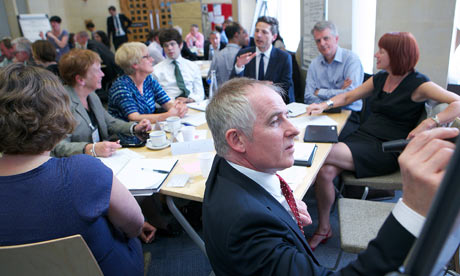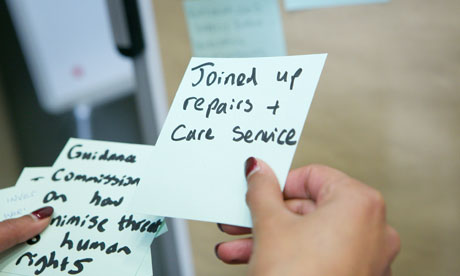‘Woefully inadequate homecare presents a massive challenge’
Government summit hears that reform is needed to reverse ‘race to the bottom’ on care amid budget squeeze and ageing population

The timing was accidental — but striking. On the day the government was hosting a summit to drive improvements in the way some of the most vulnerable members of society are cared for at home, the BBC released TV footage showing the human impact of failings in the system. The scenes showing an 83-year-old woman becoming upset as her carer failed to turn up on time were a stark reminder that some of the care provided to people in their own homes is woefully inadequate.
As care and support minister Norman Lamb put it: “The report on the BBC was not an isolated experience — we know there are lots of examples, along with the very good care we also see. We have all got a responsibility to address the fact that there are some very vulnerable people at risk in their own homes. Behind your own front door you are particularly vulnerable because no one can see what’s happening.”
Speaking at the high-level summit to launch the government’s homecare innovation challenge, Lamb said that, amid the squeeze on budgets and increasing demographic pressures, there could no be no doubt as to the scale of the task to improve a system which currently could “incentivise poor care, low wages and neglect”.
“When you think about how the care needs of the community are going to continue to grow inexorably as we all live longer along, there’s a massive challenge,” he said. “One can feel anxious and almost overwhelmed by that challenge but on the other hand one can be excited by the potential to improve things from where we are.”
 Norman Lamb recognises the scale of the task ahead in improving a system which currently could ‘incentivise poor care, low wages and neglect’. Photograph: Anna Gordon/The Guardian
Norman Lamb recognises the scale of the task ahead in improving a system which currently could ‘incentivise poor care, low wages and neglect’. Photograph: Anna Gordon/The Guardian
Exploring that potential for improvement was the aim of the summit, which brought together senior figures from homecare providers and local authorities as well as frontline carers and technology and design experts.
The Department of Health hopes the event will kickstart debate and information-sharing to tackle barriers to high-quality home care and spread good practice. The summit was conducted according to Chatham House rules, under which comments from the floor are not attributed to allow for frank debate.
Key themes emerged as participants discussed real-life problems faced by some of the older or disabled people cared for at home. Cases included that of a woman who was left in filthy clothes and bedding after her carers decided to stop doing her washing.
Another client was left stuck on the toilet when her carer said that her allotted time for the visit had been used up making the woman a sandwich. Both of these scenarios, the event was told, demonstrated that the system was far too inflexible, with caring too often built around specific timeslots or tasks, rather than what was best for the individual.
“‘Commissioning is often poor,” said one participant. “We need to see more outcome-based commissioning and less rigidity.” One carer said: “Everything is to do with time.”
Giving service users more choices and a greater say in their care is vital. Too often, the summit heard, people felt they had little say about when their carers would come and what sort of services they would receive. Often, they felt too frightened to complain.
“There’s a real lack of choice of provider and people are not empowered to change their provider or staff themselves,” one participant said. “That leads to a lack of dignity.”
 Other ideas including improving communication and monitoring service users and their families more fully are set to be explored further. Photograph: Anna Gordon/The Guardian
Other ideas including improving communication and monitoring service users and their families more fully are set to be explored further. Photograph: Anna Gordon/The Guardian
Then there’s the problem of low wages and lack of training within the home care sector. As tightening budgets lead to a downward pressure on costs, there is too often a “race to the bottom” on prices. That can lead to problems in recruiting the staff with the right attitudes rather than just anyone who’s prepared to do the job.
It’s a pressure the minister recognises. “If we just engage in a race to bottom and commission on a time basis, the lowest bidder will win,” Lamb said. “Standards are going to suffer and people are going to receive poor care because corners are going to be cut. We have a collective responsibility to challenge that.”
But, with councils facing another £2.1bn in funding cuts over the next spending review period, there won’t be a sudden influx of resources to pump into homecare any time soon. “No government of any political persuasion is going to find a whole lot more money to throw at this,” said Lamb.
So what can be done to make the experiences of those care for at home better? Key, said the minister, was “smarter” commissioning, with commissioners using their purchasing power more effectively to drive up standards. Better use could be made of technology, said one participant, “not replacing personal contact but complementing and enhancing it”.
A raft of other ideas, including improving communication and monitoring and engaging service users and their families more fully, are set to be explored further as the homecare innovation challenge rolls out over the coming months.
But the event also raised a broader issue. Should communities and families take more responsibility for care as the older population grows? That was certainly the view of one participant, who claimed: “We have encouraged a culture where the solution seems to be to buy something all the time.”
Lamb said he was keen to explore supporting individuals and communities to become more involved in providing care. “If we are to ensure our system is sustainable and people have good life, which is what we are focused on, it has to be a collaboration between people in the community, the family and the statutory services,” he said.
“It will not work if we put all the strain on local authorities and providers to deliver care with families and communities standing back. We must not abandon people but if we can achieve the very best from statutory services and combine that with a strength-based approach based on our assets as citizens, we will all have a responsibility for it.”






